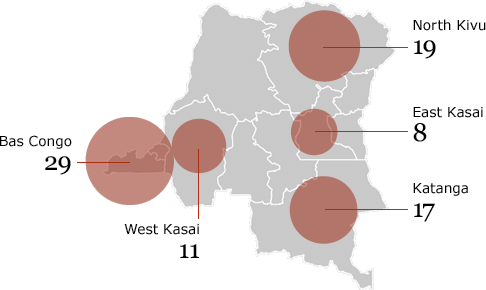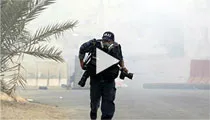Journalists reporting on renewed conflict in the east were repeatedly censored and intimidated by local officials, the national government, and rebel forces. Fighting resumed in the east after President Joseph Kabila said his government would try to arrest Bosco Ntaganda, a former warlord wanted by the International Criminal Court on war crime charges. In response, Ntaganda joined with army mutineers to form a rebel group that took control of key towns in North Kivu province. The state-run media regulatory agency barred all broadcasters from airing programs discussing the conflict; several radio stations were suspended indefinitely after interviewing the mutineers. At least three journalists fled into hiding after being threatened in reprisal for their reporting on the conflict. Tensions between DRC and neighboring Rwanda also grew after the publication in June of a leaked U.N. report that blamed Kigali for providing military assistance to the rebels. The same month, Communications Minister Lambert Mende accused a Kinshasa newspaper of tribalism and indefinitely suspended the publication in connection with an editorial critical of Congolese of Rwandan ancestry. Although danger was severe in the east, CPJ also documented numerous instances in which officials in Bas Congo detained and intimidated critical journalists.
Democratic Republic of the Congo
» Journalists covering conflict in the east are intimidated, censored.
» Numerous anti-press attacks occur in the capital and North Kivu province.
Journalists reporting on renewed conflict in the east were repeatedly censored and intimidated by local officials, the national government, and rebel forces. Fighting resumed in the east after President Joseph Kabila said his government would try to arrest Bosco Ntaganda, a former warlord wanted by the International Criminal Court on war crime charges. In response, Ntaganda joined with army mutineers to form a rebel group that took control of key towns in North Kivu province. The state-run media regulatory agency barred all broadcasters from airing programs discussing the conflict; several radio stations were suspended indefinitely after interviewing the mutineers. At least three journalists fled into hiding after being threatened in reprisal for their reporting on the conflict. Tensions between DRC and neighboring Rwanda also grew after the publication in June of a leaked U.N. report that blamed Kigali for providing military assistance to the rebels. The same month, Communications Minister Lambert Mende accused a Kinshasa newspaper of tribalism and indefinitely suspended the publication in connection with an editorial critical of Congolese of Rwandan ancestry. Although danger was severe in the east, CPJ also documented numerous instances in which officials in Bas Congo detained and intimidated critical journalists.
-
90
Anti-press attacks -
220%
Increase in eastern attacks -
0
Stations covering conflict -
10
Attacks on station
The greatest number of attacks on the press occurred in the capital region, Bas Congo, according to CPJ research through December 7, 2012. CPJ documented instances of official censorship, arbitrary detention, imprisonment, intimidation, and other forms of harassment.

Anti-press attacks increased significantly in 2012 in North Kivu province with journalists in the crossfire between government forces and Ntaganda-allied rebels. CPJ documented 24 instances of harassment, intimidation, and censorship through December 31, 2012, up from just five reports in 2011.
The media regulatory agency barred talk shows and call-in programs from airing commentary on the conflict in the east. At least five radio stations were forced off the air for broadcasting critical commentaries, according to CPJ research.
Ngoma FM: | Suspended indefinitely after airing phone interviews with a renegade army spokesman in October. |
Radio Lisanga Télévision: | Forced off the air during a live September interview with an opposition politician who accused the president of allowing Rwandan interference. |
Radio Soleil: | Suspended for three months after airing phone interviews with a rebel spokesman in August. The show's presenter is banned from the airwaves. |
Radio Liberté: | Suspended for three months after airing phone interviews in May with a militia leader and a mutineer. The show's presenter, Pili Pili Kasaï, is imprisoned for 13 days. |
Radio Okapi: | Suspended for three days after airing interviews with leader of M23 rebels. |
Radio Lisanga Télévision, a private broadcaster supportive of veteran opposition leader Etienne Tshisekedi, has been censored and attacked numerous times since 2011, according to CPJ research. RLTV operates two stations in DRC, one in Kinshasa and one in the central city of Mbuji-Mayi.
June 19, 2011: | Unidentified men with machetes injure Baby Balukuna, presenter of the nightly talk show "Support Etienne Tshisekedi," the local press freedom group Journaliste en Danger reports. |
July 9, 2011: | RLTV loses its broadcast signal while covering an anti-government march. Communication Minister Mende bans RLTV across the country and tells CPJ the station incited protesters against the government. |
August 2011: | RLTV journalists report anonymous threats after broadcasting footage of empty seats at a local stadium during the convention of the ruling party. |
September 6, 2011: | Armed men torch the studios of RLTV hours after government supporters threaten revenge for the ransacking of the ruling party's headquarters. |
October 29, 2011: | Police arrest RLTV cameraman Pierre Tshishiku for filming an anti-government march, according to news reports. He is imprisoned for three days. |
November 7, 2011: | RLTV is suspended for a week for airing a speech of an opposition leader who called on supporters to storm the prisons and free political prisoners. |
December 2, 2011: | RLTV presenter Eliezer Thambwe reports anonymous death threats in connection with his "Support Etienne Tshisekedi" program, JED reported. |
December 3, 2011: | RLTV is suspended for a week after reporting non-official presidential election results, JED reported. |
December 5, 2011: | Police in Mbuji-Mayi storm the RLTV studios and seal them without explanation. |
September 6, 2012: | RLTV is forced off the air during a live interview with an opposition politician who accuses the president of allowing Rwandan military interference in eastern DRC. |

